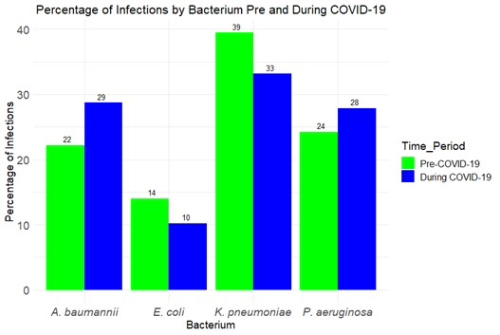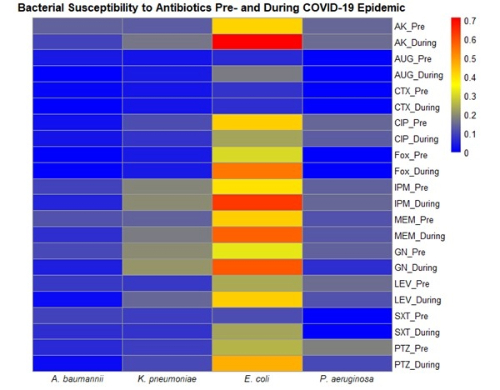Exploring Antimicrobial Resistance During the COVID-19 Pandemic: A Comprehensive Analysis
About me
Greetings, fellow microbiology enthusiasts! My name is, Dr Mai Zafer. I’m an Associate Professor of Microbiology and Immunology at Ahram Canadian University, Cairo, Egypt. My research primarily focuses on understanding antimicrobial resistance (AMR) patterns and the mechanisms driving these changes in pathogenic bacteria. This work is critical as AMR poses a significant threat to public health globally, leading to increased morbidity, mortality, and healthcare costs.
The importance of my research
In our ever-evolving battle against infectious diseases, understanding how bacteria develop resistance to antibiotics is paramount. My research delves into the dynamics of bacterial infections and antibiotic resistance, particularly in Gram-negative pathogens causing infections in immunocompromised patients in hospital settings. This knowledge is crucial for developing effective strategies to combat resistant infections and ensuring the efficacy of antibiotics for future generations.

My recent paper: a glimpse into the impact of COVID-19 on AMR
Our latest study, titled "Antimicrobial Resistance Patterns among Critical Priority Pathogens in an Intensive Care Unit at a Tertiary Hospital in Egypt: A Descriptive Analysis Comparing Pre- and COVID-19 Eras," provides valuable insights into how the COVID-19 pandemic has influenced bacterial infection rates and antibiotic resistance patterns.

Background and Findings:
The COVID-19 pandemic has laid bare the vulnerabilities in our healthcare systems, including the surveillance and management of AMR. Our study highlights a noticeable shift in the prevalence of Gram-negative bacteria during the pandemic, with Klebsiella pneumoniae, Pseudomonas aeruginosa, Escherichia coli, and Acinetobacter baumannii being the predominant pathogens. Interestingly, K. pneumoniae remained the most common, both before and during the pandemic.
We observed an increase in A. baumannii and P. aeruginosa infections post-pandemic, likely due to prolonged ICU stays and inappropriate use of empirical antibiotics. Conversely, there was a decrease in E. coli and K. pneumoniae infections, suggesting effective control measures or shifts in bacterial prevalence. These changes underscore the pandemic's impact on AMR, necessitating ongoing vigilance and adaptation in healthcare practices.
The spark behind the research
The decision to investigate this topic stemmed from the urgent need to understand how the unprecedented healthcare crisis of COVID-19 affected AMR patterns. The moment it all came together was during the initial months of the pandemic when we noticed unusual trends in infection rates and resistance patterns in our hospital, Kasr Al Aini, the largest tertiary hospital receiving patients from all over Egypt. This observation drove our hypothesis that the pandemic significantly impacted AMR dynamics.
Research process
The research process was both challenging and enlightening. Conducting a retrospective study during a pandemic posed several obstacles, from accessing patient records to ensuring data accuracy. One standout memory was the collaborative effort within our team, which highlighted the collective commitment to addressing this critical issue.
Future implications
We hope this research will inform better antimicrobial stewardship and infection control practices, especially in times of crisis. Understanding the shifts in AMR patterns can guide more effective empirical treatment choices and help prevent the spread of resistant infections.
Excitement for the future
The future of AMR research is both exciting and essential. With ongoing advancements in microbiology and immunology, we are better equipped to tackle the challenges posed by resistant pathogens. The insights gained from studies like ours will pave the way for innovative solutions, ensuring that we stay ahead in the fight against AMR.
By shedding light on the interplay between COVID-19 and AMR, our research underscores the need for collaboration in addressing this silent pandemic. The journey has just begun, and I am optimistic about the strides we can make in safeguarding public health against the ever-evolving threat of antimicrobial resistance.
